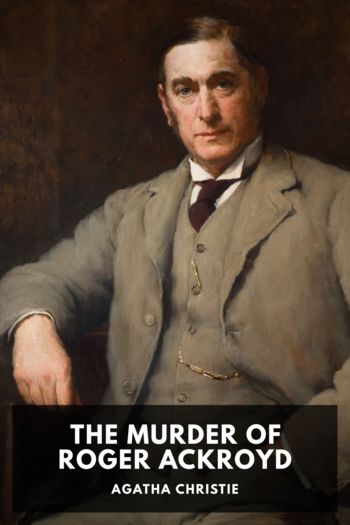The Clerkenwell Tales Peter Ackroyd (nice books to read TXT) 📖

- Author: Peter Ackroyd
Book online «The Clerkenwell Tales Peter Ackroyd (nice books to read TXT) 📖». Author Peter Ackroyd
Magga was settled on a little stool near the prow of the barge; standing beside her, Gilbert used a long pole to move them against the current. At the stern a young boy, the shipman’s assistant, worked with his oar. From the wharf at Sea-Coal Lane they passed the great bulk of the Fleet prison; it was moated by a ditch, and Magga put the sleeve of her gown up to her nose as the barge passed it. Two prisoners were soliciting alms by the riverside, putting out a box and saucer to the boatmen as they passed; the barge came so close to the bank that Magga noticed the image of a spiked door impressed upon their pewter dish. From the vantage of the water she could see the valley in front of her through which the river flowed, with the steeper slopes upon the eastern side where there were houses and barns; by the bank here the tanners had set up a row of sheds, and the Fleet had become dyed deep with red. It might have been a river of blood. The air, too, was stained with odours compounded by the entrails and refuse which were carted down from the Shambles and thrown into the water.
Gilbert leaned over his pole and spoke softly to Magga. “I was afraid to tell you where we were, in case you lost heart.”
“Never in this world.”
They passed under a double-arched stone bridge; there was a windmill, just beyond a row of tenements and hostels which Magga recognised to be Turnmill Street. The Wife of Bath was walking there with Rose; Dame Alice pointed towards the boat gliding gently across the water.
Gilbert resumed his labour. “What is the broadest water and the least danger to walk over?” Magga shook her head. “The dew. And tell me this. What is it that never freezes?”
“I cannot tell. How can I tell?”
“Hot water.” This was the game known as “Puzzled Balthasar,” in which the shipman delighted.
“What is the cleanest leaf among all other leaves?”
Magga did not reply, but she guessed the answer.
“It is the holly leaf, for nobody will wipe his arse with it.”
“I shall stop my ears, Gilbert. Whatever next?”
“How many calves’ tails can reach from the earth to the sky?”
“Gilbert!”
“No more than one, if it is long enough.”
The water became cleaner, and the air fresher, as they passed through Smithfield and came up to the fields belonging to the House of Mary at Clerkenwell. The reeve, Oswald Koo, was wheeling a cart filled with sacks. Magga pointed to the range of buildings behind him. “That is where the nun comes from.” She crossed herself. “The Holy Spirit protect her.”
“She has prophesied Richard’s death.”
“She has been drawn into kings’ games. They are not made to meddle with.”
“Unless she would be queen.”
“No. Not her. She is a good maid. She is one of God’s.”
The river curved westward here, following the line of the valley, and had become slower in its course. In the fields beside it boards and shields had been set up for archery practice, and there were fixed stone marks for sessions of javelin throwing. “I have seen in Sweden,” the shipman was saying, “a river that is called I know not what, but it exists still. On the Saturday it runs fast, and all the week after it stands still or runs but little. There is another river in the same country that at the night freezes, but upon the day no frost is seen.” Magga delighted in his tales of the distant world. He had told her of the men who have only one foot but that foot is so large that, when they lie and rest, it shadows all the body against the sun. He had described to her the children of Ethiopia whose hair is white, and the inhabitants of Ormuz where it is so hot that their bollocks hang down to their knees. Gilbert had seen the mountain, seven miles high, where Noah’s ark had come to rest. There was a well by the coast of India which changed its odour, and its taste, from hour to hour. In Sumatra there was a market for fresh children to be bought and sold, as food, which they say is the best flesh and the sweetest of all the world.
They had come up now to the pleasant mount, and in the neighbouring fields the beasts of the village were still grazing on the stubble. The wheat and the rye had been sown, and a large wooden statue of the Virgin placed in the fields in order to invoke a good harvest. Coke Bateman, the miller, was kneeling before it. “Tell me,” said Magga, “of the strange folk of the earth.”
He was distracted for a moment by a bend in the river, which now turned north-westward towards the woods. “The men of Caffolos hang their friends, when they be dying, upon trees. They say that it is better that the birds, who are the angels of God, should eat them rather than the foul worms of the earth.” Magga was listening intently. “On another island, Tracoda by name, the men eat the flesh of serpents. They live in caves and do not speak, but hiss as serpents do.”
“Is it possible?”
“All things are possible under the moon.”
“As Hendyng says.”
They laughed at this. The phrase “as Hendyng says” or “quoth Hendyng” was current in London, as a way of concluding some line of wit or wisdom. “Friendless are the dead, quoth Hendyng” was a





Comments (0)